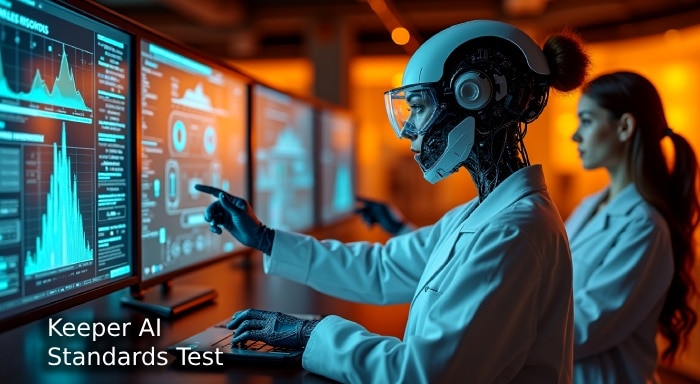The way we examine and make judgments has already been completely transformed by AI systems. Effective AI systems are useful in all fields, from loan approval to medical diagnosis. A consistent framework for ethical testing is now required as a result of the broad deployment of AI. As a result, the Keeper AI Standards Test becomes a complete solution that enables businesses to check their AI systems against accepted ethical standards.
Keeper AI now allows worldwide companies to check and validate their AI implementations. All the questions in the test focus on specific target areas such as fairness metrics, bias detection, and transparency needs. The following sections explain the definition, objectives, methodology, impact, and applications of the test.
What Is Keeper AI Standards Test?
It is primarily a structured framework for assessment that helps ensure that the AI systems work within the regulatory, ethical, and performance-specific parameters. It prioritizes aspects like fairness, transparency, and accountability. The test comprises a complete process to assess AI solutions across numerous domains. It is an intelligent approach to assessing the quality of AI products.
The framework of the test has three primary layers that collectively determine the successful assessment of the AI system:
- Organizational Layer: In this system, the focus is on determining whether the organization aligns its values and overall strategies with the ethical considerations of artificial intelligence. It covers assessing the wider policies of the organization and decision-making regarding the usage of AI.
- Environmental Layer: This layer of assessment deals with compliance with stakeholder and legal requirements related to the overall impact on the environment. It evaluates how the AI platform operates within the broader context of society. Furthermore, it checks whether the platform is aligned with the user’s expectations and environmental regulations.
- AI System Layer: Here, the focus is on the development aspects as well as operational governance of an AI platform. Essentially, it evaluates the design, implementation, and management of the system from an ethical point of view. It comprises parameters like model training, data collection, and deployment processes.
What Are the Objectives of the Keeper AI Standards Test?
The evaluation serves multifaceted objectives. Some of those objectives are suggested in the following points:
- Ensuring Ethical Deployment of AI: The test is crucial for making sure that the AI model is aligned with ethical factors like transparency, fairness, and bias mitigation.
- Assessing Accuracy and Performance: The AI platforms need to satisfy specific benchmarks for accuracy while also reducing inconsistencies and errors.
- Privacy Compliance and Security Assessment: The test makes sure that applications of AI are compliant with the best practices of cybersecurity and data protection guidelines.
- Checking Interpretability and Explainability: The assessment checks whether the decisions made by the AI systems are justifiable and interpretable.
- Improving the Accountability of AI: AI developers and organizations need to showcase responsibility in the deployment and usage of AI.
Key Criteria in Evaluations
There are diverse metrics used for evaluation that cover multiple areas of AI system assessment. All these metrics ensure a complete approach to both ethical compliance and technical performance:
Ethical Considerations:
- Mitigation strategies and bias detection.
- Adhering to guidelines of AI ethics such as the EU AI Act, IEEE, etc.
- Assessment of social impact.
Performance of Algorithms:
- Overall precision and accuracy of AI systems.
- Robustness under various conditions.
- Total consistency in the context of decision-making.
Privacy and Decision-making:
- Robust measures for protection of user privacy and encryption of data.
- Compliance with CCPA, GDPR, and various other regulations related to data privacy.
- Protection against adversarial attacks.
Also Read
Noisee AI: The Best AI Music Video Generator for Stunning Visuals
Explainability and Transparency:
- Interpretability of AI models.
- Comprehensive documentation of decision-making aspects.
- Open-source accessibility for verification.
Regulatory Compliance:
- Plan for assessing and mitigating risks.
- Adherence to key industry standards.
- All certification processes regarding AI systems.
Keeper AI Standards Test: Methodology of Assessment
The assessment process is segmented into multiple phases to make sure that the evaluation is thorough-
- Preliminary Review- AI systems conduct an initial assessment depending on source code, documentation, and declared measures for compliance.
- Algorithmic Testing- AI models are passed through controlled environments for testing to assess bias detection and performance.
- Security Audit- The resilience of the AI system against numerous cybersecurity threats is evaluated with the help of vulnerability assessments and performance testing.
- Ethical Review- Experts analyze the ethical considerations of the AI model such as societal impacts and potential biases.
- Final Certification- AI platforms that tick all the boxes get a Keeper AI Standards Certification, indicating compliance with correct practices.
What Is the Impact of the Keeper AI Standards Test?
Execution of this assessment across industries has worked as a catalyst across the landscape of the AI industry. It has ensured vast improvement methods in development techniques while also ensuring higher transparency and accountability in the AI systems.
Responsible Development of AI:
Companies that integrate the assessment can comprehensively make sure that the AI solutions are ethically secure, effective, and performance-driven.
Establishing Credibility in AI Technologies:
Keeper AI framework establishes a higher framework for AI accountability. It is quite crucial for establishing better trust between regulators, AI developers, and end-users.
Improving Regulatory Compliance:
The framework assists AI-based organizations meet all regulatory requirements. This further ensures both ethical and legal compliance.
Improving AI Innovation:
By establishing higher standards, the test motivates AI developers to develop more trustworthy and reliable AI platforms.
What Are the Industry-Specific Application Areas of the Keeper AI Standards Test?
The test demonstrates its flexibility by implementing ethical AI practices in all types of industries. Despite diverse industries having their challenges and needs for AI compilation and validation, the test finds its relevance in all areas.
Healthcare Compliance:
Healthcare companies must meet intricate requirements when deploying AI systems. Recent research indicates that robust regulatory systems aid in establishing reliability in the safe adoption of AI within healthcare. The framework comprises important areas like regulations for medical devices. AI systems must register with particular regulatory bodies and certain standards. It is imperative for healthcare facilities that leverage AI to satisfy needed safety and quality benchmarks. There is also a need to ensure privacy and protection of patient data.
Manufacturing Quality Control:
Artificial Intelligence has completely redefined the quality control processes of the manufacturing industry. In inspection processes, it has minimized labor costs by 30-50% compared to traditional methods of inspection. Essentially, AI helps in automatic defect detection, live analysis of production processes, predictive maintenance, analysis of root causes, etc.
Financial Services:
AI adoption has reached advanced levels in the sector of finance. Ensuring higher payment validation and screening is one of its advantages. This has prompted banks to rely on AI systems to reduce rejection rates related to account validation by almost 20%. This test can make sure that AI systems are ready for accurate fraud prevention and detection, regulatory compliance automation, risk assessment and management, customer service improvement, etc.
Conclusion
Due to the widespread adoption and application of AI systems, the need for a robust framework to carry out ethical testing has increased. The Keeper AI Standards Test establishes clear benchmarks for AI ethics, performance, and security. Such frameworks are essential for encouraging innovation, maintaining ethical integrity, and responsible deployment of AI.
Related Posts:








